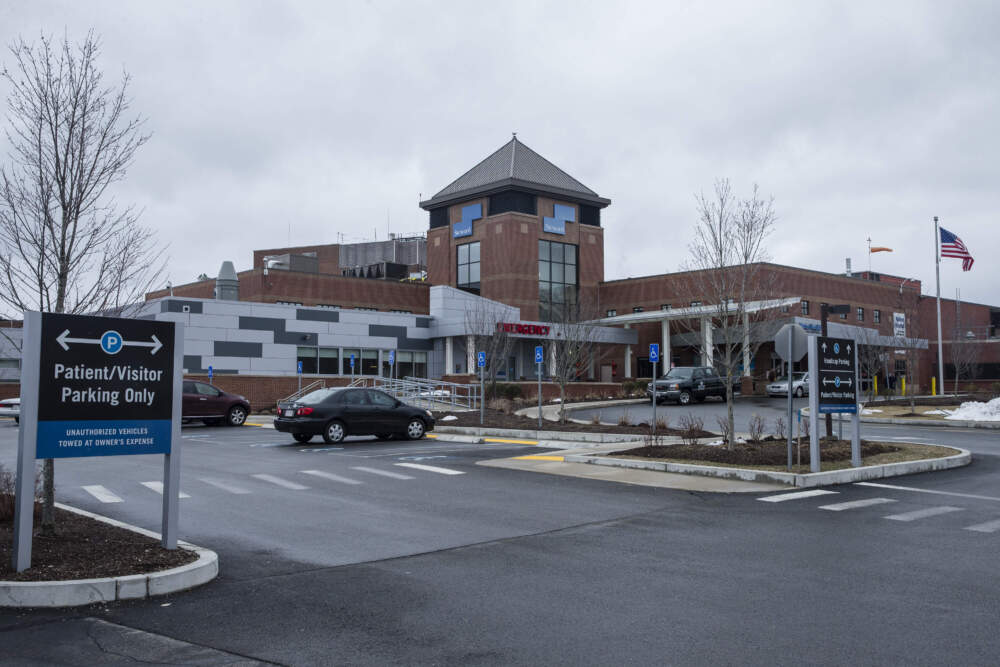Advertisement
Anxiety is high as Mass. Steward hospitals await auctions
Resume
After months of uncertainty around the future of Steward Health Care, the company’s hospitals are set to be sold at a series of auctions this summer. But the sales process is off to a rocky start, and public officials and health care leaders are growing concerned that not all of Steward’s hospitals will attract buyers.
Steward, a private, for-profit company, filed for Chapter 11 bankruptcy protection in May and had planned to auction off dozens of hospitals in June. But those auctions have been delayed. Steward’s seven operating Massachusetts hospitals are now scheduled for auction on July 18, though the date still could change.
“We have extended the bid deadlines to a more reasonable date. The extension gives everyone involved time to develop robust bids,” Steward said in a statement to WBUR.
But hospital industry and bankruptcy experts said the delay also may be a sign of tepid interest from potential buyers, and the complexity of completing a deal that involves not only Steward, but the company that serves as its landlord.
The delay is adding to the anxiety among people in communities that rely on Steward hospitals for medical care and jobs.
David Storto, a consultant and former Massachusetts hospital executive, said he’s skeptical that many hospital operators will be eager to submit bids for Steward hospitals.
“Operationally and financially, they’re struggling,” he said, “so it’s always been a bit of a head-scratcher for me to really understand what any particular bidder would be acquiring.”
State data shows many of Steward’s Massachusetts hospitals are losing money. And court documents detail the need for maintenance and repairs for equipment as basic as elevators.
Meanwhile, as Steward’s financial problems mount and the company’s future remains cloudy, doctors and patients have started fleeing the system.
Storto said he’s concerned even a well-intentioned buyer will have trouble making a deal for a Steward hospital. “How do you make it work financially, with the degree of investment that is required?” he said.
A hospital sale typically takes months or even years. Steward doesn’t have that kind of time. It’s relying on temporary financing to keep the doors of its hospitals open. The company hasn’t said how long that financing will last, but its deals with lenders demand that it sell its assets quickly.
"How do you make it work financially, with the degree of investment that's required?"
David Storto, a former Massachusetts hospital executive
Steward operates 31 hospitals in eight states. It has been marketing its hospitals and doctors group to potential buyers for months. If it can’t make a deal for some of these assets through auctions planned for July and August, Steward could make another attempt to sell. But bankruptcy experts said closures are a possibility.
A benefit of buying hospitals in bankruptcy is that the purchaser can acquire an asset without taking on all the various debts associated with it. Yet it’s unclear if this will entice many suitors. Most health care leaders aren’t publicly saying whether they’ll bid for a piece of Steward’s business. Optum, a sister company of the big insurer UnitedHealthcare, was negotiating a deal to acquire Steward’s physician network, but later walked away, according to state officials and Steward.
The hospital operator Southcoast Health announced in March that it was trying to acquire Steward’s St. Anne’s Hospital in Fall River. Southcoast executives told WBUR they're still seeking a deal.
“Our interest in welcoming St. Anne’s Hospital to the Southcoast Health family remains strong, and our primary focus is on what is best for our community, patients and workforce,” Southcoast chief executive David McCready said in a statement.
Advertisement
The delay in the auction process gives bidders more time to prepare bids, but it also could deter them.
Kathleen Hart, a spokesperson for Lifespan health system in Rhode Island, said: “Since Steward filed for bankruptcy and the assets of all their properties are declining every day, Lifespan has not made a final decision on whether to make a bid for any of these hospitals.”
Lifespan executives are analyzing financial data closely as they determine whether to submit a bid, Hart said in a written statement.
One of the biggest complications in any potential deal is that Steward does not own its real estate. In 2016, the company sold its property to an Alabama-based real estate investment trust, Medical Properties Trust, or MPT, and is locked into escalating lease payments. Steward used the proceeds of the property sale to pay investors and expand nationally.
Now, any operator that makes a bid on a Steward hospital also has to work out a deal with MPT. That means agreeing to a lease, or making an offer to purchase the property from MPT.
“You have the issue of the master lease here, and that is complicating everything,” said Bradford Sandler, a bankruptcy lawyer and partner at the firm Pachulski, Stang, Ziehl & Jones, who is familiar with the Steward case. “Bidders may be concerned about making a bid without having MPT on board.”
Another issue: Steward and MPT are not likely to agree on how to split up the proceeds of hospital sales. They’re planning to resolve those disputes in mediation.
So, Sandler said, bidders have a lot to weigh.
“There may be regulatory issues here for certain bidders,” he said. “There may be a tremendous amount of [capital expenditures] that have to be put into these hospitals. To the extent that they're losing patients, that's obviously an issue as well.”
"Above all, the state's goal is to keep the Steward hospitals open."
Eric Gold, former health insurance division chief for the state attorney general's office
The auctions are scheduled to take place in a high-rise office building on New York's Fifth Avenue, where groups of lawyers and financial advisors gather in conference rooms and virtually to negotiate terms of the sales — in secret. The winning bids will be made public.
A federal bankruptcy court judge must approve the sales. And state regulators also have a role. In Massachusetts, regulators approve hospital licenses and consider the cost and other implications of a hospital sale before a deal is finalized.
Eric Gold, a partner at Manatt Health who used to run the health care division of the Massachusetts attorney general’s office, said state officials are under pressure to preserve access to health care and jobs.
“Above all, the state's goal is to keep the Steward hospitals open,” he said, “and it's going to be a challenge for the commonwealth to effectively review the transactions that are proposed, and at the same time assure that the hospitals will stay open, especially if there aren't a lot of bidders.”
Gov. Maura Healey has repeatedly promised to protect patients, workers and the state’s health care system — but has not detailed exactly how her administration will do that. Unionized nurses and members of the Boston City Council are among those calling on the administration to, if necessary, seize Steward hospitals by eminent domain to save them.
"It is critical care that is in the balance here."
State Sen. Marc Pacheco, D-Taunton
Olivia James, a spokesperson for the Executive Office of Health and Human Services, did not respond to questions about whether the administration is considering eminent domain or other strategies to preserve the Steward hospitals. But James said the administration “has had many direct and pointed conversations with Steward, MPT and all of the principals involved to ensure a smooth transition” to new operators.
Steward, founded in Boston with private equity backing in 2010, has been facing a growing burden of debt. The scope of these problems became public almost six months ago, rattling health care leaders, public officials, workers and patients.

State Sen. Marc Pacheco, a Democrat from Taunton — home to Steward’s Morton Hospital — said there’s still so much uncertainty about the future of Steward’s hospitals that legislators don’t know exactly how to respond. He said he’ll urge his colleagues to return to session later this summer, if needed, to address the hospitals' futures.
“If there are no buyers, we still have to figure out a strategy to keep [the hospitals] open,” Pacheco said. “Absolutely. Because it is critical care that is in the balance here.”
Pacheco is optimistic that Morton Hospital will attract bidders. But like so many others, he’s waiting for the results of Steward’s auctions.
“We're talking about literally life-and-death situations here,” he said. “And I just hope we see a plan very, very soon.”
This segment aired on July 2, 2024.
